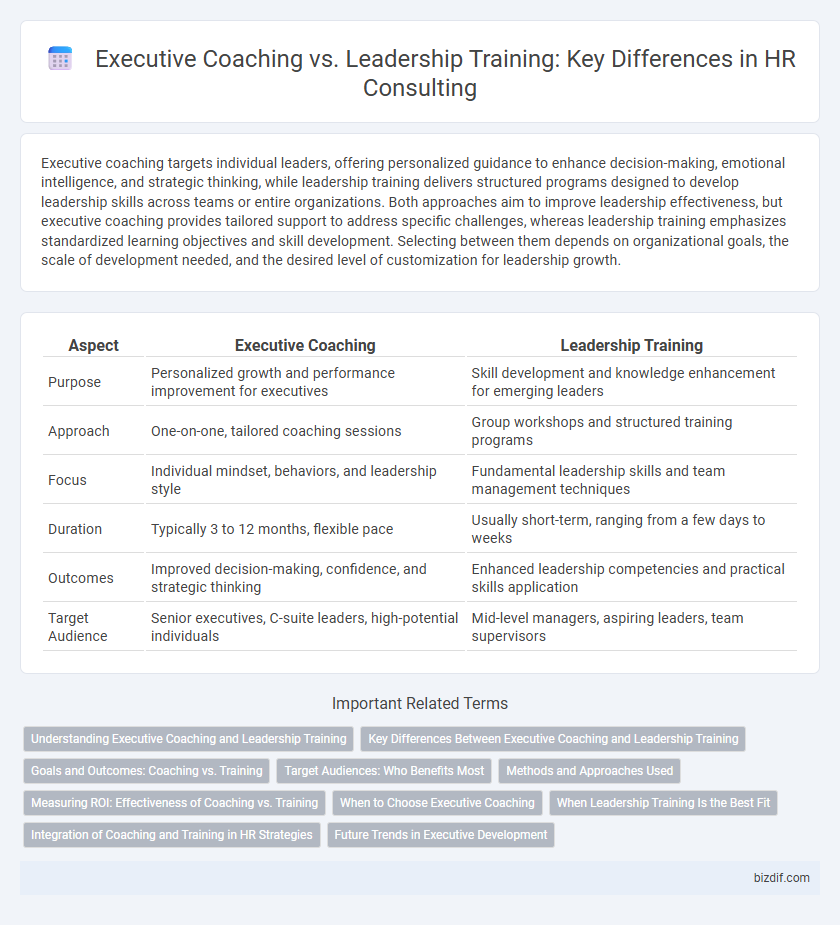Executive coaching targets individual leaders, offering personalized guidance to enhance decision-making, emotional intelligence, and strategic thinking, while leadership training delivers structured programs designed to develop leadership skills across teams or entire organizations. Both approaches aim to improve leadership effectiveness, but executive coaching provides tailored support to address specific challenges, whereas leadership training emphasizes standardized learning objectives and skill development. Selecting between them depends on organizational goals, the scale of development needed, and the desired level of customization for leadership growth.
Table of Comparison
| Aspect | Executive Coaching | Leadership Training |
|---|---|---|
| Purpose | Personalized growth and performance improvement for executives | Skill development and knowledge enhancement for emerging leaders |
| Approach | One-on-one, tailored coaching sessions | Group workshops and structured training programs |
| Focus | Individual mindset, behaviors, and leadership style | Fundamental leadership skills and team management techniques |
| Duration | Typically 3 to 12 months, flexible pace | Usually short-term, ranging from a few days to weeks |
| Outcomes | Improved decision-making, confidence, and strategic thinking | Enhanced leadership competencies and practical skills application |
| Target Audience | Senior executives, C-suite leaders, high-potential individuals | Mid-level managers, aspiring leaders, team supervisors |
Understanding Executive Coaching and Leadership Training
Executive coaching involves personalized, one-on-one support tailored to enhance an individual leader's performance and strategic decision-making skills, while leadership training typically delivers group-based programs aimed at developing core leadership competencies across teams. Executive coaching emphasizes self-awareness, behavioral change, and goal-driven development plans, leveraging continuous feedback and reflection to foster transformative growth. Leadership training focuses on standardized skill-building workshops, such as communication, conflict resolution, and team management, designed to align leadership practices with organizational objectives.
Key Differences Between Executive Coaching and Leadership Training
Executive coaching offers personalized, one-on-one guidance tailored to an individual leader's specific challenges and goals, fostering self-awareness and strategic decision-making. Leadership training typically involves group sessions that equip participants with foundational skills and knowledge through structured curricula and standardized methodologies. The key difference lies in the customization and depth of development, with executive coaching delivering targeted, ongoing support, whereas leadership training provides broad-based skill acquisition for multiple leaders simultaneously.
Goals and Outcomes: Coaching vs. Training
Executive coaching focuses on personalized development goals to enhance individual leadership capabilities, fostering self-awareness and decision-making skills tailored to the executive's unique challenges. Leadership training programs deliver structured learning experiences aimed at building foundational leadership competencies across teams, emphasizing skill acquisition and behavioral change. Coaching achieves long-term transformation through tailored feedback and accountability, while training drives immediate competency improvements through standardized curriculum and group interaction.
Target Audiences: Who Benefits Most
Executive coaching primarily benefits senior leaders and C-suite executives seeking personalized development to enhance decision-making, strategic thinking, and emotional intelligence. Leadership training is designed for mid-level managers and emerging leaders aiming to build foundational skills in team management, communication, and operational leadership. Organizations often invest in executive coaching for tailored growth at the top tiers, while leadership training supports broader talent development and succession planning.
Methods and Approaches Used
Executive coaching employs personalized, one-on-one sessions tailored to individual strengths and challenges, utilizing techniques such as reflective questioning, goal-setting, and behavioral feedback. Leadership training typically involves group workshops, seminars, and simulations designed to develop core competencies through structured curricula and interactive exercises. Both methods incorporate assessment tools like 360-degree feedback, but executive coaching emphasizes ongoing, adaptive support while leadership training focuses on skill acquisition within a time-bound framework.
Measuring ROI: Effectiveness of Coaching vs. Training
Measuring ROI in executive coaching often reveals higher individual performance improvement due to personalized goal-setting and feedback, while leadership training typically shows broader skill development across teams. Executive coaching outcomes are quantifiable through enhanced decision-making, employee engagement, and retention rates, as tracked over specific time frames. Leadership training effectiveness is assessed via standardized assessments, 360-degree feedback, and team productivity metrics, providing a collective return on investment analysis.
When to Choose Executive Coaching
Executive coaching is ideal for senior leaders facing complex challenges requiring personalized guidance to enhance decision-making and emotional intelligence. Organizations should choose executive coaching when the goal is to develop tailored leadership strategies that align with individual strengths and business objectives. Unlike broader leadership training, executive coaching addresses specific leadership gaps, fostering sustainable performance improvements at the executive level.
When Leadership Training Is the Best Fit
Leadership training is the best fit when organizations aim to develop a cohesive management style across teams and enhance specific skill sets, such as communication, conflict resolution, and strategic thinking. This approach is ideal for cultivating leadership competencies at various organizational levels, ensuring consistent application of company values and leadership principles. Executive coaching, by contrast, is more personalized and suits senior leaders facing unique challenges or preparing for higher responsibilities.
Integration of Coaching and Training in HR Strategies
Executive coaching provides personalized development tailored to individual leaders, enhancing self-awareness and decision-making skills, while leadership training delivers structured programs aimed at building collective competencies across teams. Integrating coaching and training within HR strategies creates a holistic approach that aligns individual growth with organizational goals, fostering sustainable leadership effectiveness. This combination ensures targeted skill development and continuous feedback loops, driving improved performance and talent retention.
Future Trends in Executive Development
Executive coaching increasingly integrates AI-driven analytics to personalize development plans, enhancing leadership adaptability and emotional intelligence in complex business environments. Leadership training programs are evolving with immersive virtual reality simulations that foster experiential learning and real-time feedback, accelerating skill acquisition for future-ready executives. Emphasis on continuous learning ecosystems and data-driven performance metrics marks the shift toward dynamic, scalable executive development strategies.
Executive coaching vs leadership training Infographic

 bizdif.com
bizdif.com